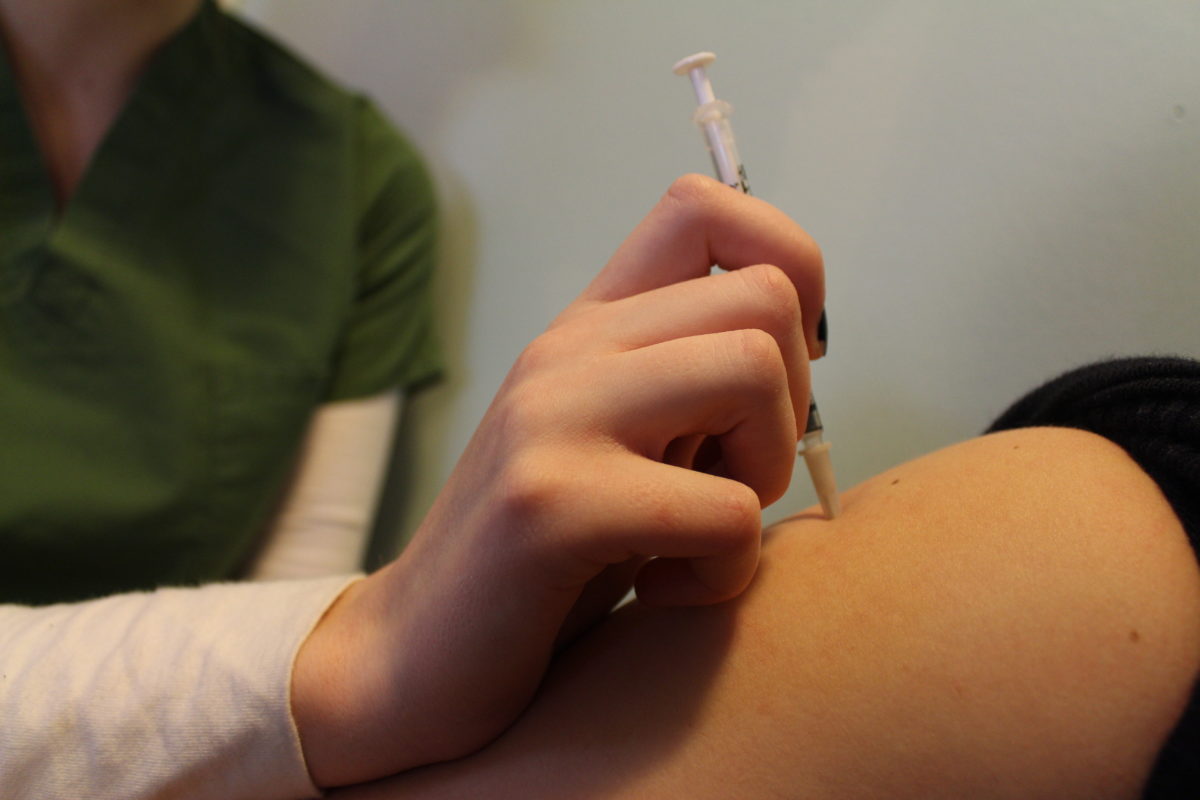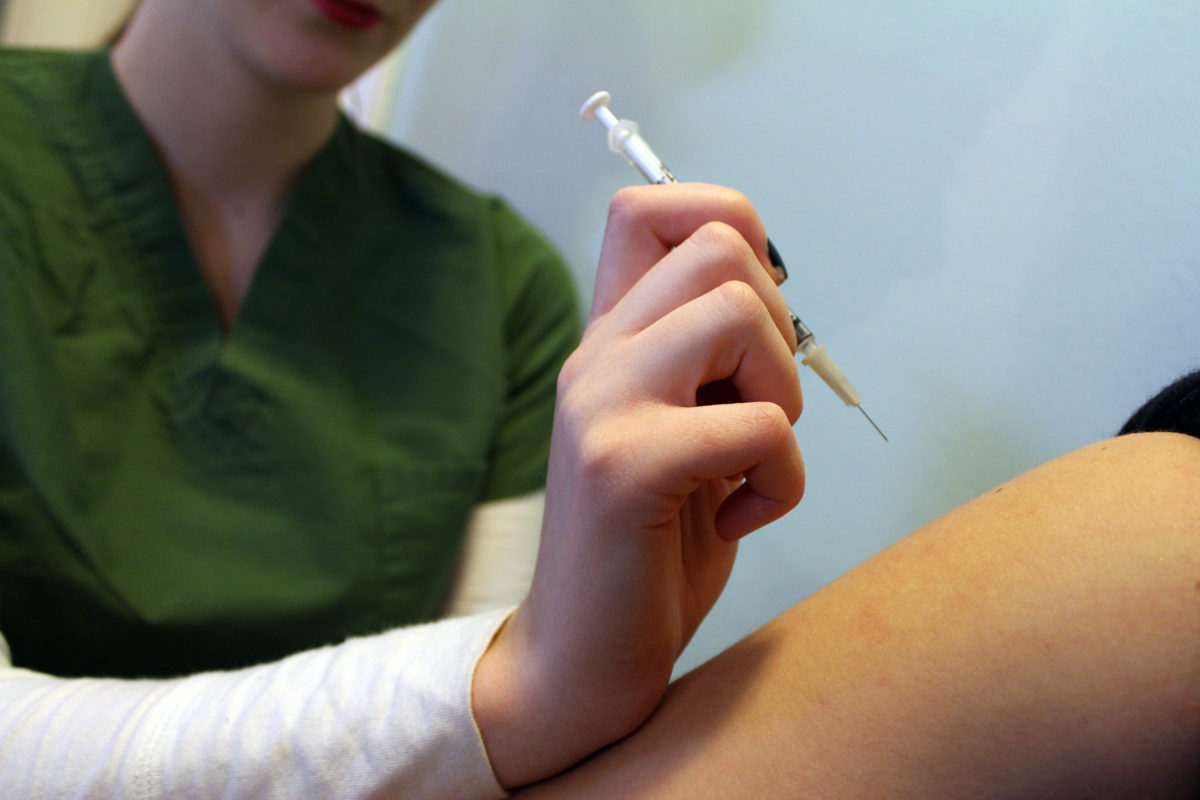The 18th C. philosopher Jean-Jacques Rousseau writes that “nature never deceives us; it is we who deceive ourselves.”

Rousseau questioned the benefit of progress and said we should return to nature, which is pure and unblemished. And it’s that Rousseauean impulse that is motivating anti-vaxxers, said St. Thomas religious and philosophy professor Matt Dinan.
“There is a misguided notion of what is natural… If these serious diseases are reemerging, then I think we need to be critical about the way we understand these things.”
Dinan is one of several St. Thomas professors to use the controversy as a teaching moment. The recent outbreak of measles in the United States has ignited a debate about largely affluent, educated parents who refuse to vaccinate their children, and these anti-vaxxers are taking the heat. Hillary Clinton tweeted on Feb. 3., “The science is clear: the Earth is round, the sky is blue and #vaccineswork. Let’s protect our kids. #GrandmothersKnowBest.” Data released to the media by the Toronto school board showed that the highest rates of unvaccinated children is at alternative schools often favoured by wealthy, educated families.
“We’ve become really accustomed to think when something comes from anti-science that we expect it to come from religious people, but that’s not who is doing this,” said Dinan. “These would be the types of people who would drive a Prius, like to go camping and love nature.”
New Brunswick is one of the only provinces in Canada that mandates children to be immunized before entering schools. There’s a good reason for that, said fourth-year UNB nursing student Laura Aubin. Vaccines save lives.
“[Vaccines] are the most important intervention that we have to protect individuals in our society,” she said. “In the past 50 years, immunizations have protected more people and saved more lives than any other public health initiative to date.”
Aubin said vaccines for children are so important because they protect against diseases such as measles and polio.
“In Canada, they are accessible, they are free and they are safe,” she said.
But if that message is going to be communicated effectively, St. Thomas science and technology professor Kelly Bronson said public health and regulatory agencies need to change their discourse of vaccines.
“It’s easy to assume that this is just ignorance,” she said. “Basing the public health messaging on this ignorance leads to particular types of communication strategies stressing that vaccines are safe – almost a uniform and universal message that vaccines are safe.”
Bronson said public health should take into account some case analysis that show that the issue is not necessarily technical ignorance or scientific ignorance.
Bronson does not use the word “anti-vaccine,” but instead “vaccine hesitancy” when teaching her students about this issue in her controversy in science and technology class.
“It isn’t necessarily irrational to not be pro-vaccine. There is something more beyond concern over the science that is at play.”
Bronson said parents not vaccinating their children are less concerned with the messaging toward the aggregate or collective than for their particular child. So, these parents largely ignore public health messaging.
These parents, because they are affluent and privileged, can spend the money on home schooling, the best organic foods, the best sleep and no stress – and ultimately believe they don’t need an immunization to protect their child, said Bronson.
“The state has the right like public health to protect the population as a whole – by insisting almost heavy-handedly that parents vaccinate their children against preventable diseases like measles,” she said. “And the parents, especially American, have the right to do what they want to do – they have rights over their children.”
Bronson said she had some concerns about vaccinating her children as well, but her doctor reassured her.
“My doctor back in Toronto talked about his experiences with his kids, knowing probably that he and I are not all that dissimilar. He was not much older than me, similar education and he just spoke about what he chose to do with his kids.
“So he just humanized it to the particular. I think if doctors were to take it into account that people have particular concerns rather than speaking to the aggregate and humanize it then the messaging would be more effective.”
Dinan said it comes down to a misguided interpretation of what it means to be natural.
“The use of a vaccine relies on how our bodies would naturally deal with pathogens and in that sense it shows the contradictions of natural. So I am pro-vaccine, but it’s interesting to look at why would otherwise reasonable people do this sort of thing.”
This romantic desire to rediscover the purity of the state of nature is at least as old as Rousseau, but it’s intensifying, he said.
“A lot of us — I do this too — are really inclined to buy organic. If there is the word ‘natural’ on it, then we will pay five dollars more for it than we otherwise would.”
But this idea, this impulse, said Dinan, can be dangerous.
“People have been really unequivocal about criticizing these people [anti-vaxxers] and I think that’s right, but it’s also a moment where we can ask: well, why would someone think this? It’s just so obvious. Who wants to get whooping cough? Who wants to get polio? Nobody wants to get that, so why would otherwise educated, sane people not vaccinate their children?”
Clarification: In an earlier version, Kelly Bronson was described as being “hesitant” about vaccinating her children before talking to her physician. The AQ did not mean to convey that she was ever an anti-vaxxer.

